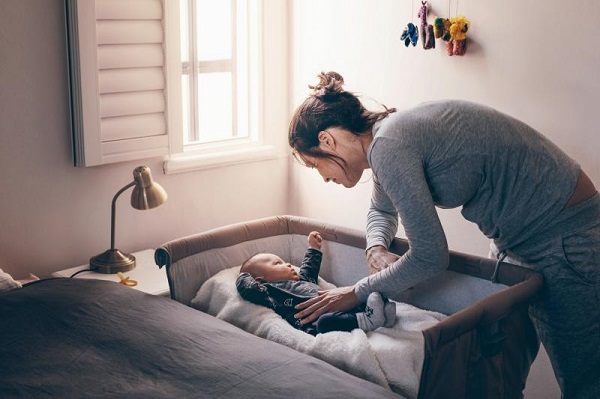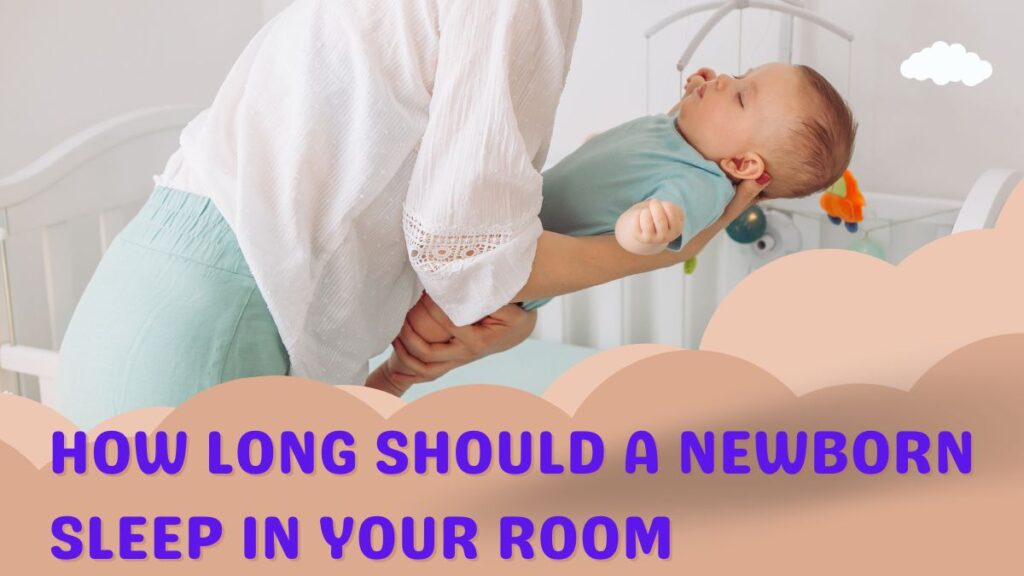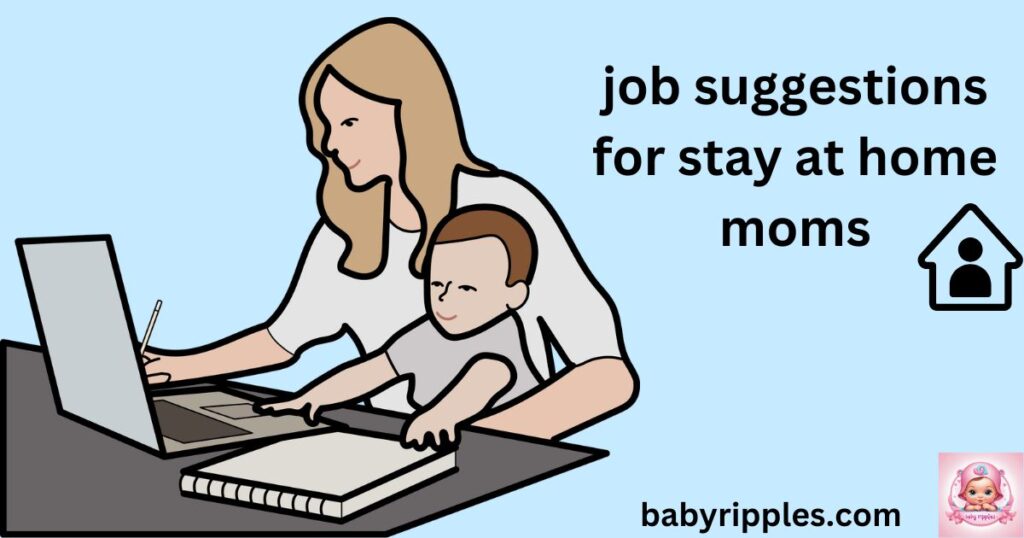Your newborn’s sleep, comfort, and safety are your first concerns when you bring them home. “How long should a newborn sleep in your room?” is a question that new parents frequently ask. This choice requires weighing the advice of experts, the demands of your family, and the development of your unborn child. Let’s dissect it in detail so you can make an informed choice.
You may want to read: Infant Wake Windows by Age
- Understanding Safe Sleep Recommendations
- Why Is Room-Sharing Beneficial?
- Factors to Consider: How Long Should a Newborn Sleep in Your Room?
- Step-by-Step Guide: Transitioning Your Baby to Their Own Room
- At What Age Do Most Children Start Sleeping in a Crib Alone?
- When Did You Start Having Your Baby Sleep in Their Own Room?
- Products to Support Your Baby’s Sleep Transition
- Alternative Options: Room-Sharing with Flexibility
- Final Thoughts
- FAQs: How Long Should a Newborn Sleep in Your Room?
Understanding Safe Sleep Recommendations

For at least the first six months and ideally for up to a year, babies should sleep in the same room as their parents, according to the American Academy of Pediatrics (AAP). The incidence of SIDS is considerably decreased by this practice, which is called room-sharing.
But sharing a room does not equate to sharing a bed. Your infant should sleep without blankets, cushions, or toys on a distinct, firm surface, such as a crib or cot.

Why Is Room-Sharing Beneficial?
Safety: Sleeping in your room allows you to respond quickly to your baby’s needs and monitor them closely.

Breastfeeding Convenience: Night feedings are easier when your baby is nearby.
Bonding: Your presence reassures your baby, helping them adjust to life outside the womb.
Factors to Consider: How Long Should a Newborn Sleep in Your Room?
While experts recommend six months to a year, the exact duration varies for each family. Consider these factors:
1. Your Baby’s Sleep Patterns
Babies who start sleeping for longer stretches at night may be ready to transition to their own room earlier. If your newborn still wakes every 2–3 hours, keeping them in your room can be more convenient.
2. Space and Safety
If your baby outgrows their bassinet or starts rolling over, it might be time to move them to a crib. Ensure the crib is set up in a safe sleep environment, whether in your room or theirs.
3. Parental Preferences
Some parents feel ready to transition their baby after a few months, while others prefer to wait longer. Listen to your instincts and prioritize what works for your family.
4. Baby’s Developmental Milestones
If your baby can roll from belly to back and shows signs of growing independence, they might be ready for their own space.
Step-by-Step Guide: Transitioning Your Baby to Their Own Room

If you decide to move your baby out of your room, follow these steps for a smooth transition:
1. Start with Naps
Let your baby take naps in their crib during the day. This helps them get used to the new environment.
2. Create a Safe Sleep Space
Set up your baby’s room with:
- A firm crib mattress and fitted sheet
- No pillows, toys, or loose bedding
- Blackout curtains to create a soothing environment
- A white noise machine for consistent sound
3. Establish a Bedtime Routine
A consistent routine helps your baby associate the new space with sleep. Consider activities like:
- A warm bath
- A gentle massage
- A bedtime story or lullaby
4. Use a Baby Monitor
A reliable video monitor can give you peace of mind as you transition your baby to their room. This ensures you can respond quickly if needed.
5. Stay Close Initially
For the first few nights, consider sleeping in your baby’s room or just outside the door to ease the transition for both of you.
At What Age Do Most Children Start Sleeping in a Crib Alone?

By 6 to 12 months, most kids start sleeping in their cribs. Nonetheless, some parents decide to transition their child earlier, particularly if they exhibit readiness indicators like sleeping for longer periods of time or outgrowing their cot.
When Did You Start Having Your Baby Sleep in Their Own Room?
The experiences of parents differ greatly. While some wait until their child is a year old, others begin transitioning as early as3 to 4 months. The important thing is to base your choice on what your family feels is appropriate and in keeping with safe sleep practices.
Products to Support Your Baby’s Sleep Transition
Making the move from room-sharing to independent sleeping can feel overwhelming. These products can help ensure a smooth process:
- A Convertible Crib: Designed to grow with your baby, providing comfort and safety for years.
- White Noise Machine: Helps mask household noises and creates a soothing sleep environment.
- Blackout Curtains: Blocks out light to support better naps and nighttime sleep.
- Video Baby Monitor: Lets you keep a close eye on your baby, even from another room.
- Sleep Sack or Swaddle: Keeps your baby cozy without the risks of loose bedding.
Investing in high-quality sleep products gives you confidence and peace of mind as your baby transitions.
Alternative Options: Room-Sharing with Flexibility

If you’re not ready to move your baby to their own room, consider these alternatives:
Move the Crib to Your Room: This gives your baby more space while keeping them close.
Co-Sleeping Products: Portable bassinets that can be placed next to your bed offer a middle ground.
Final Thoughts
Every parent has to make a personal and significant decision about how long should a newborn sleep in your room . Although it is generally advised that babies spend the first six months of their lives in your room, each family’s circumstances may differ. Some may decide to continue co-sleeping for a longer period of time, while others may feel at ease sooner. Prioritizing your peace of mind, your baby’s safety, and their comfort is crucial.
To make sure your choice is in line with healthy sleep practices, it’s crucial to speak with your pediatrician before moving your baby into their own room or deciding how long a newborn should be in your room. To provide a safe sleeping environment, make sure the baby’s room is equipped with a crib, a firm mattress, and no loose bedding.
.
Remember, you are the best judge of your baby’s needs and your family’s lifestyle, so trust your instincts as you make this big transition. Your baby’s health, comfort, and well-being are always the top priority!
FAQs: How Long Should a Newborn Sleep in Your Room?
1. How long should a newborn baby sleep in your room?
Experts recommend room-sharing for at least the first six months, ideally up to one year, to reduce SIDS risk and promote bonding.
2. At what age do most children start sleeping in a crib alone?
Most children move to a crib by 6–12 months, depending on their readiness and family preferences.
3. When did you start having your baby sleep in their own room?
Parents’ experiences vary. Some start as early as 2–3 months, while others wait until their baby is a year old.
4. Is it safe for a newborn to sleep in their own room?
Yes, but only if their sleep environment is safe, with a firm mattress, no loose bedding, and a smoke-free space.
5. What products can help transition my baby to their own room?
Products like a convertible crib, white noise machine, blackout curtains, and a baby monitor can make the transition easier and safer.





